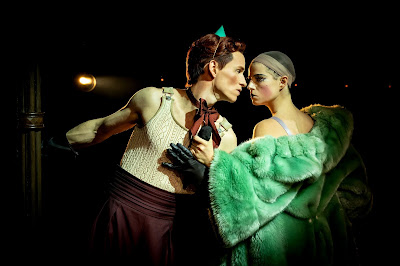****
Book by Joseph Stein
Lyrics by Sheldon Harnick
Music by Jerry Bock
Directed by Jordan Fein
,%20%20Credit%20Marc%20Brenner.jpg) |
| Raphael Papo |
Jordan Fein’s revival of Fiddler On The Roof first seen at London’s Open Air Theatre last year, returns to the city’s Barbican Theatre before a nationwide tour to last the rest of the year. As Tevye and Golde, Adam Dannheiser and Lara Pulver remain in their leading roles with both having matured from 2024.
Dannheiser always commanded the essentials of a Tevye . A big, bearded, Bear Jew of a man devoted to both family and faith and convincing as he deploys both humour and perfectly pitched pathos in his wrestling with life’s challenges, Dannheiser’s performance is one of the evening’s delights.
Pulver has grown in the last 12 months. Her role is now fully formed and be it gossiping with Yente, nagging Tevye, or just being the all-caring matriarch to her family, hers is a great Golde. While Tevye gets most of the juicy singing numbers in the show, Pulver, who’s musical theatre credentials are impeccable, makes fine work of the duetting balladry gifted to her by Harnick and Bock. Natasha Jules Bernard steps up to the role of Tzeitel, with Georgia Bruce returning as Hodel and Hannah Bristow as the clarinet playing Chava continuing to give Tevye one of the toughest challenges that can face an orthodox Jew.
Fiddler On The Roof is a Broadway classic and this production’s details are a treat. Beverley Klein’s maturely considered Yente and Raphael Papo’s enchanting Fiddler are fabulous. Julia Cheng’s choreography excites, while Tom Scutt’s ingenious design has beautifully translated the shtetl of Anatevka from the elements of Regent’s Park to the conventions of traditional theatre.
This musical remains a story of hope interwoven with never-ending tragedy. The show is set in Tsarist Russia around the turn of the 20th century when state-sponsored antisemitism was the norm, and the dark clouds of the Holocaust that was to befall European Jewry hadn’t even begun to form. Playing out in 2025, as calls for the destruction of the Jewish state echo around the world, the United Nations spouts blood libels that are echoed by governments and the media and murderous Jew-hate is manifest from Washington DC to Colorado, it feels like little has changed.
This is a beautiful production playing to a very ugly world.
This is a beautiful production playing to a very ugly world.
Runs until 19th July, then on tour
Photo credit: Marc Brenner






